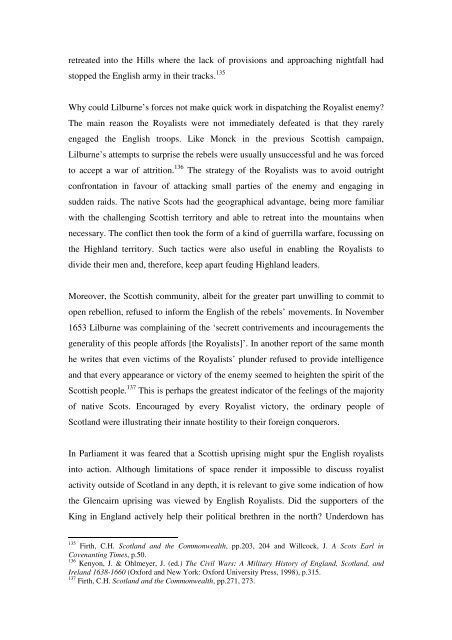The Glencairn Uprising, 1653-54 Helen Baker Department of ...
The Glencairn Uprising, 1653-54 Helen Baker Department of ...
The Glencairn Uprising, 1653-54 Helen Baker Department of ...
You also want an ePaper? Increase the reach of your titles
YUMPU automatically turns print PDFs into web optimized ePapers that Google loves.
etreated into the Hills where the lack <strong>of</strong> provisions and approaching nightfall had<br />
stopped the English army in their tracks. 135<br />
Why could Lilburne’s forces not make quick work in dispatching the Royalist enemy?<br />
<strong>The</strong> main reason the Royalists were not immediately defeated is that they rarely<br />
engaged the English troops. Like Monck in the previous Scottish campaign,<br />
Lilburne’s attempts to surprise the rebels were usually unsuccessful and he was forced<br />
to accept a war <strong>of</strong> attrition. 136 <strong>The</strong> strategy <strong>of</strong> the Royalists was to avoid outright<br />
confrontation in favour <strong>of</strong> attacking small parties <strong>of</strong> the enemy and engaging in<br />
sudden raids. <strong>The</strong> native Scots had the geographical advantage, being more familiar<br />
with the challenging Scottish territory and able to retreat into the mountains when<br />
necessary. <strong>The</strong> conflict then took the form <strong>of</strong> a kind <strong>of</strong> guerrilla warfare, focussing on<br />
the Highland territory. Such tactics were also useful in enabling the Royalists to<br />
divide their men and, therefore, keep apart feuding Highland leaders.<br />
Moreover, the Scottish community, albeit for the greater part unwilling to commit to<br />
open rebellion, refused to inform the English <strong>of</strong> the rebels’ movements. In November<br />
<strong>1653</strong> Lilburne was complaining <strong>of</strong> the ‘secrett contrivements and incouragements the<br />
generality <strong>of</strong> this people affords [the Royalists]’. In another report <strong>of</strong> the same month<br />
he writes that even victims <strong>of</strong> the Royalists’ plunder refused to provide intelligence<br />
and that every appearance or victory <strong>of</strong> the enemy seemed to heighten the spirit <strong>of</strong> the<br />
Scottish people. 137 This is perhaps the greatest indicator <strong>of</strong> the feelings <strong>of</strong> the majority<br />
<strong>of</strong> native Scots. Encouraged by every Royalist victory, the ordinary people <strong>of</strong><br />
Scotland were illustrating their innate hostility to their foreign conquerors.<br />
In Parliament it was feared that a Scottish uprising might spur the English royalists<br />
into action. Although limitations <strong>of</strong> space render it impossible to discuss royalist<br />
activity outside <strong>of</strong> Scotland in any depth, it is relevant to give some indication <strong>of</strong> how<br />
the <strong>Glencairn</strong> uprising was viewed by English Royalists. Did the supporters <strong>of</strong> the<br />
King in England actively help their political brethren in the north? Underdown has<br />
135 Firth, C.H. Scotland and the Commonwealth, pp.203, 204 and Willcock, J. A Scots Earl in<br />
Covenanting Times, p.50.<br />
136 Kenyon, J. & Ohlmeyer, J. (ed.) <strong>The</strong> Civil Wars: A Military History <strong>of</strong> England, Scotland, and<br />
Ireland 1638-1660 (Oxford and New York: Oxford University Press, 1998), p.315.<br />
137 Firth, C.H. Scotland and the Commonwealth, pp.271, 273.
















